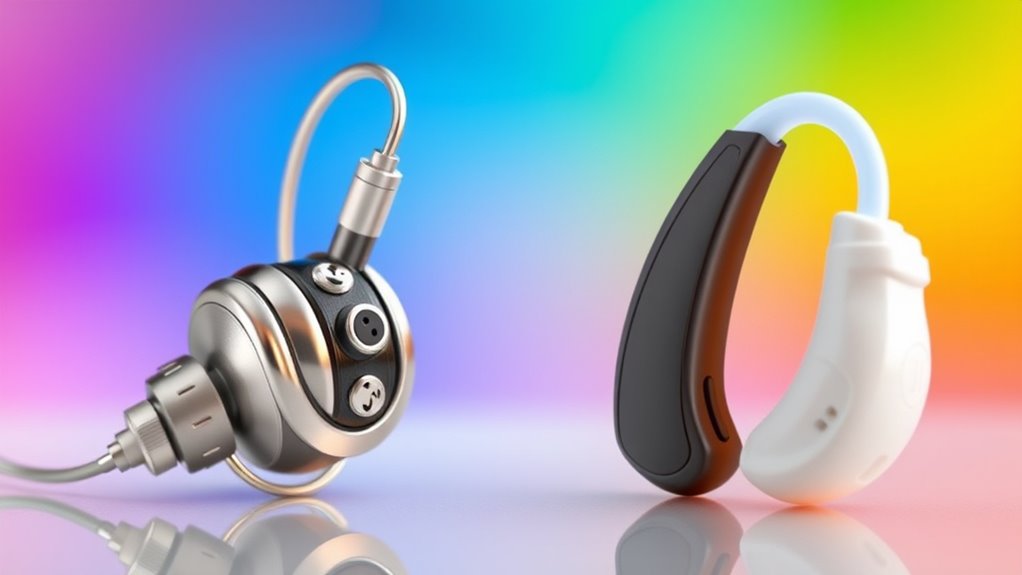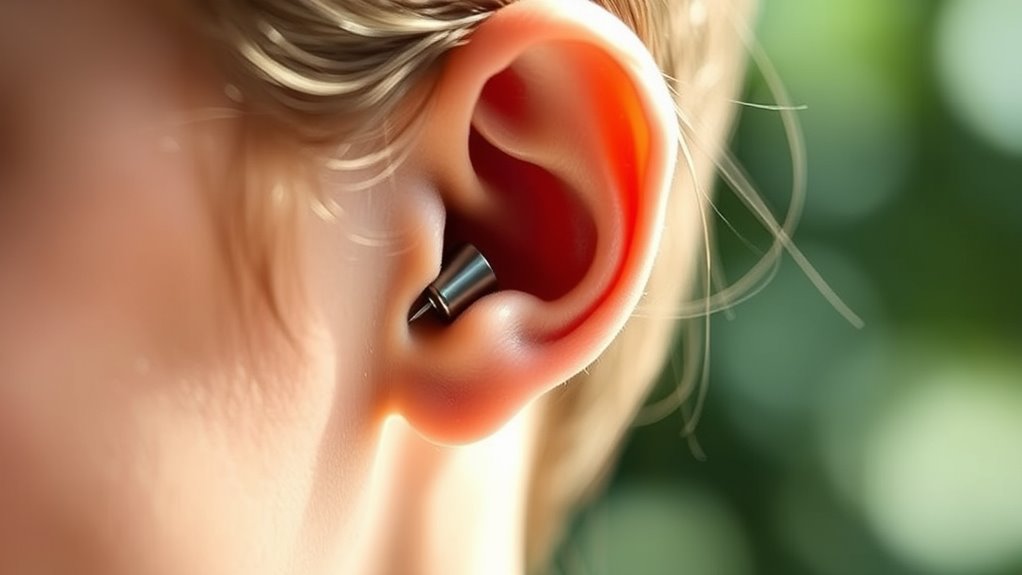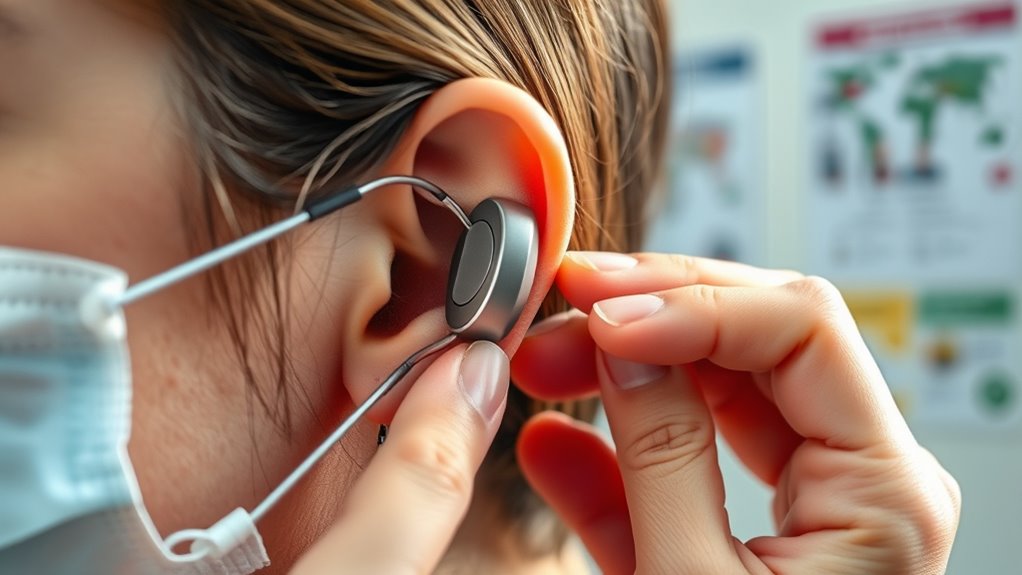Cochlear implants can substantially improve your hearing by directly stimulating your auditory nerve, offering clearer sounds and better communication than hearing aids. They help you understand speech, participate socially, and boost confidence. However, surgery involves risks like infection and device failure, and outcomes vary depending on individual factors. Maintenance and costs are ongoing considerations. If you’re curious about how they work or if they’re right for you, exploring further reveals valuable insights.
Key Takeaways
- Cochlear implants improve hearing and speech perception but may have variable outcomes depending on individual health and age.
- Surgical risks include infection, nerve damage, and device failure, requiring careful evaluation and monitoring.
- Benefits include enhanced communication and social participation, especially when implanted early in children.
- Ongoing maintenance, repairs, and external device vulnerability can incur additional costs and technical challenges.
- Success depends on proper candidacy assessment, rehabilitation, and realistic expectations of hearing improvements.
How Cochlear Implants Function Compared to Hearing Aids

While hearing aids amplify sounds to make residual hearing clearer, cochlear implants work differently by directly stimulating the auditory nerve. Hearing aids increase external sound volume using a microphone and internal components, helping those with mild to moderate hearing loss.
Hearing aids amplify residual sounds, while cochlear implants directly stimulate the auditory nerve for profound hearing loss.
In contrast, cochlear implants bypass damaged hair cells in your ear by converting sound into digital signals. These signals are sent via an external sound processor and speech processor, then transformed into electrical impulses. Advanced technology enables these devices to deliver highly precise stimulation tailored to each user’s needs. Understanding the technological advancements behind cochlear implants can help users maximize their benefits. Additionally, ongoing research into neural interface improvements continues to expand the potential for more natural hearing experiences.
Furthermore, recent developments in AI-driven customization allow for even more personalized and effective hearing experiences, optimizing device performance for individual users. As technology progresses, the integration of machine learning algorithms promises to further enhance sound quality and user comfort.
Advantages of Cochlear Implants

Cochlear implants can dramatically boost your hearing abilities, making sounds clearer and more natural. They also help you communicate more effectively, whether in conversations or social settings.
With these advantages, many users find their quality of life improves markedly.
Enhanced Hearing Abilities
Enhanced hearing abilities are among the most significant advantages of cochlear implants. They improve your ability to hear and understand speech, making conversations clearer and easier to follow. With cochlear implants, you can perceive sound signals more accurately, which enhances speech perception and overall communication. The external processor captures environmental sounds like alarms, sirens, and birdsong, alerting you to important cues for safety. Early implantation often leads to better language development and communication skills, especially in children. For adults with long-term hearing loss, cochlear implants increase sound awareness and social interaction. Additionally, understanding ethical hacking principles helps ensure the security of these devices against potential cyber threats. Moreover, the technology behind cochlear implants involves sophisticated medical engineering, which continues to evolve to improve user experience and safety. Staying informed about appliance maintenance plans can also help ensure the longevity and optimal performance of these devices. Regular updates and maintenance are essential as advances in device cybersecurity help protect users from emerging digital threats.
Improved Communication Skills
Improved communication skills are one of the key benefits of cochlear implants, allowing you to understand and participate in conversations more effectively. With a speech processor transforming sound signals into electrical signals, your hearing levels can markedly improve, bringing you closer to natural hearing. This hearing improvement enhances speech perception, making spoken language clearer. Imagine:
- Better understanding in noisy environments, so conversations flow smoothly.
- Reduced dependence on lip reading, allowing you to focus on the speaker.
- Enhanced participation in social and professional settings, boosting confidence.
- Incorporating sound therapy science principles can further support auditory development and healing.
- The use of avid diversity in designs from various planters demonstrates how customization and innovation can improve user experience and satisfaction.
- Advances in AI entertainment technologies can also contribute to auditory training and rehabilitation programs, making the process more engaging and effective.
Early intervention, especially in children, supports language development and social interactions.
For adults, cochlear implants provide a noticeable boost in communication, helping you engage more fully in everyday conversations.
Disadvantages and Risks Associated With Cochlear Implants

Cochlear implants come with several risks you should consider, including potential surgical complications like infection or nerve damage. Maintaining the device can also be challenging, as malfunctions may require additional surgeries and ongoing repairs. Plus, the degree of hearing improvement varies, and some users may experience side effects that affect their daily life. Regular device maintenance and monitoring are essential to ensure optimal performance and safety. Understanding the cycle of breakups can help set realistic expectations about the outcomes and ongoing adjustments needed post-implantation. Additionally, the presence of advanced filtering technologies in some devices may influence their effectiveness and user satisfaction. Proper device fitting and ongoing audiological support are crucial for maximizing benefits and addressing issues promptly. Moreover, individual differences in neuroplasticity can significantly impact how well someone adapts to the implant and benefits from it.
Surgical Complication Risks
While cochlear implant surgery offers significant benefits, it also carries certain risks. You should be aware of potential surgical risks like:
- Infection or bleeding at the surgical site, leading to swelling or discomfort.
- Nerve damage, which can cause facial paralysis or adverse reactions during the procedure.
- Device failure post-surgery, requiring additional operations for repair or replacement.
There’s also a small risk of meningitis if vaccination protocols aren’t followed properly. Vaccination protocols are essential for reducing this risk and ensuring patient safety. Additionally, maintaining proper surgical techniques can help minimize complications and promote smoother recovery. Proper preoperative assessment can identify risk factors beforehand and improve surgical outcomes. Implementing postoperative care strategies is crucial for minimizing complications and supporting healing.
Recovery might involve discomfort, swelling, and careful monitoring to prevent complications.
In rare cases, adverse reactions to anesthesia or unforeseen issues during surgery could occur.
While serious complications are uncommon, understanding these risks helps you make an informed decision about your cochlear implant.
Additionally, some studies highlight that security systems can help prevent theft-related losses in residential settings, underscoring the importance of safety considerations in various contexts.
Device Maintenance Challenges
Maintaining a cochlear implant involves ongoing responsibilities that can present challenges. You must regularly handle battery replacements or recharging, which can be costly and time-consuming. External processors are vulnerable to water, impacts, or environmental damage, increasing the risk of device failure. Internal components may malfunction or require repair or replacement, often needing surgery. These maintenance challenges lead to ongoing healthcare costs and potential device malfunction. Follow-up adjustments and programming by audiologists are necessary to optimize performance, adding to your rehabilitation efforts. Additionally, proper device maintenance is crucial to ensure the longevity and effectiveness of the implant. Recognizing the importance of audiometric testing can help detect issues early and ensure the device functions optimally over time.
Hearing Improvement Variability
Although cochlear implants can substantially improve hearing for many users, the results vary widely depending on individual factors. You might experience:
- Limited hearing improvement in noisy environments or with complex sounds.
- Reduced residual hearing if the surgery damages natural structures.
- Challenges with hearing outcomes due to neural survival and auditory nerve health.
These factors influence hearing variability, making some users see significant gains while others notice only modest benefits.
Implantation factors, such as age at surgery and duration of deafness, play a role. Device malfunctions or failures can also affect hearing outcomes, sometimes requiring additional surgeries.
Keep in mind that neural survival impacts how well your auditory nerve responds, influencing your overall experience with cochlear implants. Variability is common, so expectations should be realistic.
Evaluating Candidacy for Cochlear Implant Surgery

Evaluating your suitability for cochlear implant surgery involves a series of thorough audiological and medical assessments. Your hearing loss evaluation includes speech perception tests to determine how well you understand speech with current devices.
A key part of cochlear implant candidacy is having severe to profound sensorineural hearing loss that hasn’t improved with hearing aids, though past hearing aid use doesn’t automatically exclude you.
Medical evaluations, including imaging scans like MRI or CT, help identify any cochlear malformations or health issues that could affect surgery.
To qualify, you must meet specific candidacy criteria, demonstrating motivation and realistic expectations.
Post-surgical rehabilitation is essential for adapting to the implant.
This extensive process ensures the best outcomes for your hearing improvement journey.
Financial Considerations and Insurance Coverage

- Insurance coverage options and verify your policy’s specifics
- Financial aid programs or charitable organizations for assistance
- Planning for ongoing costs such as maintenance and follow-up therapy
Understanding what your insurance covers and what it excludes guarantees you’re financially prepared for both initial and ongoing medical expenses.
Post-Operative Care and Long-Term Maintenance

After your cochlear implant surgery, focusing on proper post-operative care guarantees a smooth recovery and ideal device function. During the initial healing, monitor the surgical site for infection, swelling, or bleeding. A follow-up visit within 1-4 weeks activates the external processor and begins auditory training. Long-term maintenance includes regular audiologist visits for device programming, adjustments, and troubleshooting to improve hearing performance. Battery management—whether charging or replacement—is vital for consistent operation. To help you stay organized, consider this:
| Aspect | Important Details |
|---|---|
| Follow-up visits | Essential for device adjustments and troubleshooting |
| Rehabilitation | Ongoing auditory training enhances hearing benefits |
| Battery management | Regular charging or replacement guarantees device uptime |
| Device troubleshooting | Resolves issues quickly to maintain peak performance |
Consistent care maximizes your implant’s benefits over time.
Frequently Asked Questions
What Are Some Pros and Cons About Cochlear Implants?
When considering cochlear implants, you should know they can greatly improve your hearing and speech understanding if hearing aids haven’t helped. You’ll be able to detect sounds and communicate more easily.
However, you’ll face surgical risks like infection or facial paralysis, and the high cost might be a barrier.
Outcomes vary depending on age and health, so it’s essential to weigh these benefits and risks carefully before deciding.
What Things Can You Not Do With a Cochlear Implant?
With a cochlear implant, you should avoid activities that could put your device at risk. Swimming or bathing without protection isn’t recommended, and high-impact sports or rough play can dislodge or damage it.
You’ll also need to steer clear of MRI scans unless specific precautions are taken.
Protect your external components from extreme heat, direct sunlight, and magnetic fields, and handle them carefully to keep your hearing experience smooth and safe.
What Is the Regret Rate for Cochlear Implants?
You’re wondering about the regret rate for cochlear implants. Typically, you’ll find that it’s quite low, ranging from 1% to 5% of users.
Factors like unmet expectations, surgical issues, or sound quality dissatisfaction can influence regret.
To minimize this, guarantee thorough counseling and early assessment.
If you’re well-informed and realistic about what to expect, you’re more likely to be satisfied and avoid feelings of regret after the procedure.
What Is a Criticism of Cochlear Implants?
You might find it surprising that critics argue cochlear implants can promote a bias toward hearing and spoken language, possibly marginalizing Deaf culture. They worry this technology could diminish the appreciation of sign language and Deaf identity.
Additionally, concerns about safety, such as infection risks, and the high costs involved, make some question whether the benefits outweigh the drawbacks. This debate highlights how cochlear implants impact cultural, safety, and accessibility considerations.
Conclusion
Deciding on a cochlear implant is like choosing a new path through a complex maze; it can open up new worlds of sound but requires careful navigation. Weigh the pros and cons, consider your health and finances, and be prepared for ongoing care. Ultimately, this device can be a bridge to clearer communication—if you’re ready to cross it with confidence and support, it might just transform your auditory experience forever.











